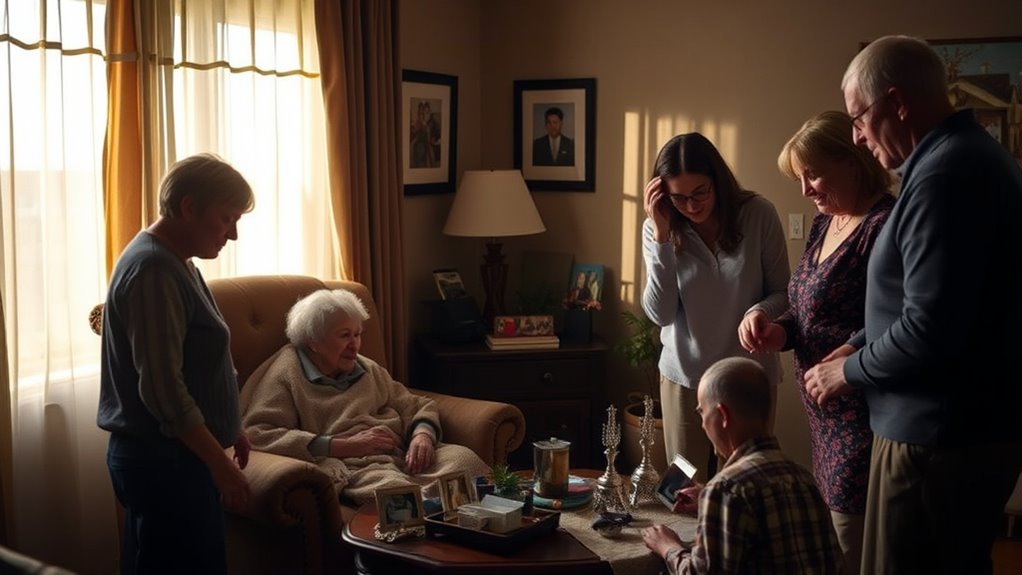To prepare your home for an imminent death, organize medical supplies like medications, gloves, and necessary devices to guarantee comfort and safety. Create a peaceful environment with soft lighting, familiar personal items, and calming sounds. Arrange for supportive care, include loved ones, and handle legal documents to respect the person’s wishes. Clear communication with family and caregivers is key. Setting up these details helps create a dignified space—more tips unfold as you continue.
Key Takeaways
- Organize and label medical supplies, medications, and equipment in an accessible, clearly marked area for easy use.
- Create a calm, familiar environment with soft lighting, personal belongings, and comforting items to promote peace.
- Arrange for supportive care by coordinating emotional, spiritual, and physical comfort measures with loved ones and caregivers.
- Prepare important legal and personal documents, including healthcare directives and family records, for quick access and clarity.
- Communicate openly with family and caregivers about wishes, care preferences, and any final arrangements to ensure understanding.
Assessing and Organizing Medical Supplies and Equipment

Before the need becomes urgent, it’s essential to assess and organize all medical supplies and equipment. Gather items like medications, syringes, gloves, and any devices your loved one uses regularly. Check expiration dates and ensure everything is clean and functional. Create a designated area, such as a corner or a box, to keep supplies accessible but organized. Label bottles and containers clearly to prevent confusion during stressful moments. Make sure you have essential items like pain relievers, antiseptics, and any prescribed medications readily available. Consider any specific needs your loved one may have, such as oxygen tanks or feeding tubes. Reviewing medical supplies management can help ensure everything is prepared appropriately. Organizing these supplies in a way that aligns with emergency preparedness can help you respond quickly and confidently when the time comes, reducing unnecessary stress and ensuring comfort.
Creating a Comfortable and Peaceful Environment

You can make the space more comforting by choosing soft, soothing lighting that relaxes everyone. Keep familiar personal items nearby to provide a sense of warmth and connection. Creating a calm, quiet environment helps everyone feel more at peace during this time. Incorporating spiritual energy can also help protect sensitive information during this sensitive period. Additionally, using environmental comfort strategies can further enhance a sense of tranquility and emotional well-being in the space. Understanding psychological comfort techniques can also assist in creating a supportive atmosphere for everyone involved.
Soft, Soothing Lighting
Soft, soothing lighting plays a pivotal role in creating a peaceful atmosphere during this sensitive time. You want to choose gentle, warm lights that cast a calm glow, avoiding harsh or bright illumination. Consider using lamps with dimmable bulbs or placing candles in safe holders to add a natural, comforting touch. Keep lighting low in the evenings to promote relaxation and help your loved one feel safe and at ease. Avoid flickering or overly complex lighting setups, which can cause discomfort or confusion. The goal is to create an environment that feels safe, cozy, and tranquil. With the right lighting, you help reduce stress and foster a sense of serenity, making it easier for everyone to find peace during this difficult moment.
Familiar Personal Items
Familiar personal items can provide a comforting sense of connection and security during this difficult time. These items remind your loved one of their identity and cherished memories, offering reassurance. To create this comforting environment, gather items that hold personal significance.
- Photographs – Display family photos or memorable moments to evoke warmth and familiarity.
- Heirlooms or Keepsakes – Keep jewelry, letters, or mementos close, as they often carry emotional weight.
- Favorite Items – Incorporate beloved books, blankets, or clothing that bring comfort and a sense of home.
Arranging these items thoughtfully helps foster peace and familiarity, making the space feel more personal and secure during this sensitive time.
Calm, Quiet Space
Creating a calm, quiet space is essential to foster comfort and peace for your loved one. Choose a room away from noise and distractions, where they can feel safe and relaxed. Keep the environment soft by dimming lights or using natural sunlight, and remove clutter that might cause stress. Minimize interruptions, turning off phones or devices that emit noise. Soft background sounds, like gentle music or nature sounds, can promote a soothing atmosphere. Guarantee comfortable seating or bedding, and keep essentials within arm’s reach. The goal is to create a space that encourages rest and serenity, helping your loved one feel at ease. A peaceful environment can greatly ease their physical discomfort and emotional distress during this sensitive time.
Arranging for Supportive Care and Assistance

You need to coordinate medical support to guarantee your loved one’s comfort and safety. Enlisting emotional assistance from friends, family, or counselors can also provide essential comfort during this time. Taking these steps helps create a supportive environment that meets both physical and emotional needs. Ensuring color accuracy in any visual aids or monitors used can also help in assessing and communicating comfort levels effectively. Additionally, maintaining proper nutritional support can contribute significantly to overall well-being during this critical period. Recognizing the importance of appliance integration can help in setting up supportive devices that enhance comfort and safety. Being aware of end-of-life care options can further ensure that your loved one’s wishes are respected and their comfort prioritized. Understanding emotional support strategies can also assist in providing reassurance and peace during this sensitive time.
Coordinating Medical Support
Coordinating medical support is essential to guarantee that your loved one receives the appropriate care during this time. You need to ascertain that all healthcare providers are aligned and informed about the patient’s needs. Start by contacting the primary care doctor or hospice team to establish a clear plan. Confirm medication schedules, symptom management, and emergency protocols.
To add depth, consider these steps:
- Schedule regular visits from healthcare professionals to monitor health and adjust care as needed.
- Keep a detailed record of medications, symptoms, and any changes to share with providers.
- Ensure that emergency contacts and medical directives are easily accessible in case urgent decisions are required.
This coordination keeps your loved one comfortable and helps prevent unnecessary hospital visits.
Enlisting Emotional Assistance
Enlisting emotional assistance is a crucial step to guarantee your loved one feels supported and cared for during this difficult time. Reach out to friends, family, or professional counselors who can provide comfort, companionship, and a listening ear. Having someone present offers reassurance and helps ease feelings of loneliness or fear. Consider involving spiritual advisors or support groups if your loved one finds solace in faith or community. Be proactive in coordinating visits and check-ins, ensuring your loved one’s emotional needs are met. Remember, emotional support isn’t just for them—it also helps you process your own feelings. By creating a network of caring individuals, you foster an environment of love, understanding, and peace that can make this transition more manageable.
Preparing Important Documents and Legal Matters

Preparing important documents and legal matters is a essential step that guarantees your wishes are honored and your loved ones are supported after your passing. You should gather and review crucial paperwork to prevent confusion later.
Preparing key documents ensures your wishes are respected and loved ones supported after you’re gone.
Consider these three key actions:
- Create or update your will to specify asset distribution and appoint an executor.
- Establish power of attorney for financial and medical decisions, ensuring someone you trust can act on your behalf.
- Organize critical records such as birth certificates, marriage licenses, insurance policies, and healthcare directives, making them easily accessible for your loved ones.
Additionally, understanding the influence of AI on music creation can help you document any digital assets or creative works that may have value or importance.
Taking these steps now reduces stress for your family and ensures your intentions are clear, providing peace of mind during a difficult time.
Communicating With Family and Caregivers

Open and honest communication with your family and caregivers is essential to guarantee everyone understands your wishes and concerns. Share your feelings and preferences openly, so they know what matters most to you. Encourage questions and listen carefully to their concerns, which helps build trust and reduces misunderstandings. Be clear about your expectations for care, comfort, and any specific needs. Regularly update everyone as your condition changes, ensuring everyone stays informed. Respectful conversations foster collaboration and emotional connection during this difficult time. If you’re uncomfortable discussing certain topics, consider involving a counselor or mediator. Remember, open dialogue minimizes confusion and supports a supportive environment for both you and your loved ones.
Setting Up Personal and Memory Items

After having honest conversations with your loved ones about your wishes, it’s helpful to organize personal and memory items that hold special significance. These items can bring comfort and connection during difficult times. Start by selecting meaningful belongings that represent your life, relationships, or values. Consider how these items will be accessible and safe for your loved ones. To add depth, think about including:
- Photographs of family, friends, and memorable events
- Personal keepsakes, like jewelry or heirlooms
- Letters or notes expressing feelings or wishes
Arrange these items in a designated space or container, making sure they’re easy to find. Preparing these tokens of your life helps your loved ones honor your memory and find solace in your presence. Understanding optimal angles for pinball machines can also serve as a comforting reminder of the importance of positioning and arrangement, whether in game setup or personal keepsake organization. Additionally, considering the exfoliating benefits of glycolic acid may inspire a sense of renewal and care as you prepare for this phase of life.
Managing Household Tasks and Finances

As you approach the end of life, it’s important to take control of household tasks and finances to reduce stress for both yourself and your loved ones. Begin by organizing important documents like wills, insurance policies, and bank details in a secure, accessible place. Notify trusted family members or close friends about your financial arrangements and any ongoing responsibilities. Consider paying off debts or setting up automatic payments to prevent missed bills. Delegate household chores to trusted individuals or make arrangements for their continued management. Review your budget to ensure funds are allocated for necessary expenses. It’s also helpful to create a list of trusted contacts and legal representatives. Additionally, understanding the importance of juice cleansing can support your overall wellness during this time, enhancing your energy and health. Incorporating pinball machine weight considerations can also be useful if you plan to set up entertainment at home, ensuring proper handling and placement. For added reassurance, look into verifying the trustworthiness of Patchology products if you plan to use skincare solutions in your routine. Being aware of newborn sunscreens and their safety can also be beneficial if you have young children in your household. Staying mindful of remote work productivity tips can help you maintain a sense of normalcy and engagement during this transitional period. Taking these steps now eases the burden on loved ones and guarantees your affairs are in order.
Planning for Emotional and Spiritual Comfort

Taking care of household tasks and finances helps create stability, but addressing your emotional and spiritual needs is equally important as you approach the end of life. You can find comfort by engaging in meaningful conversations with loved ones, sharing memories and feelings openly. Consider seeking support from a counselor, spiritual advisor, or support group to process your emotions. Reflecting on your beliefs and values can also bring peace; writing a letter or recording your thoughts can help. To deepen your sense of comfort:
- Connect with loved ones regularly, sharing your feelings.
- Engage in spiritual or religious practices that resonate with you.
- Seek professional support to address unresolved emotions or spiritual questions.
Prioritizing these steps can foster peace and acceptance during this time.
Frequently Asked Questions
How Can I Handle Unexpected Medical Emergencies at Home?
When facing unexpected medical emergencies at home, stay calm and act quickly. Call emergency services immediately, providing clear details about the situation. If possible, assist the person with basic first aid, like stopping bleeding or helping them breathe. Keep a well-stocked first aid kit nearby and familiarize yourself with its contents. Stay with the person until professional help arrives, offering reassurance and comfort throughout the process.
What Are Signs That Indicate Imminent Death?
You notice signs that indicate imminent death, such as Breathing becoming irregular or shallow, and the person’s consciousness fading. You might see a drop in blood pressure, coolness in extremities, or a change in skin color. They may become unresponsive or show little to no response to stimuli. When these signs appear, it’s often a sign that death is near, and you should seek comfort measures and support.
How Do I Prepare Children for a Loved One’s Passing?
You want to help children understand a loved one’s passing. Start by honestly explaining that it’s a natural part of life, using simple words they can grasp. Reassure them it’s okay to feel sad or confused, and encourage questions. Spend quality time together, offer comfort, and keep routines as normal as possible. Use age-appropriate books or stories to help them process their emotions and foster understanding.
What Are the Best Ways to Support a Grieving Family Member?
You can support a grieving family member by offering your presence and listening without judgment. Encourage them to express their feelings and avoid giving unsolicited advice. Help with practical tasks, like cooking or errands, to ease their burden. Remember to check in regularly and be patient, understanding that grief takes time. Your consistent support and compassion can provide comfort during this difficult period.
How Can I Ensure Dignity and Respect During End-Of-Life Care?
Remember, dignity is what we leave behind. To guarantee it during end-of-life care, listen carefully to your loved one’s wishes and respect their choices. Speak softly, offer comfort, and maintain their privacy. Be patient and gentle, avoiding unnecessary procedures or disruptions. Your compassionate presence affirms their worth, ensuring they feel loved and respected, even in their final moments. Always prioritize empathy and understanding above all.
Conclusion
Preparing your home for an imminent death can feel overwhelming, but remember, you’re shaping a space of peace and love. Organize supplies, set up comforting touches, and communicate openly with loved ones. Think of it as creating your own “home alone” sanctuary—only this time, with more hugs and heartfelt moments. By tending to these details now, you guarantee your final chapter is filled with dignity, warmth, and cherished memories.









